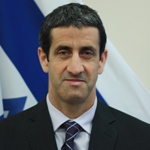At the end of July, BGen Eden Attias, Israel Ministry of Defence Attaché to Canada, will pass the torch to a successor, marking the first time such an exchange has occurred.
Until Attias, a pilot with more than 3,000 hours of ISR, airlift and special operations mission experience, took on the role almost three years ago, defence relations between Canada and Israel were managed from Israel’s embassy in Washington.
His position is in part a reflection of a growing political and military relationship between Ottawa and Tel-Aviv, strengthened in January by the signing of the Canada-Israel Strategic Partnership. On defence and security, the memorandum of understanding aims to enhance collaboration by, among other things, maintaining military attaché offices in both countries.
“We didn’t have any formalized relations between the militaries,” only random visits, Attias said of the relationship before his position was created. “It wasn’t structured.”
In fact, Canada was overseen by a desk officer responsible for all of North America. “He tried to analyze Canada with the same set of tools he was doing for someone else. It’s not the same,” Attias stressed. “A lot of our effort…is to try to explain to Israel the distinction, [the different] system and way of thinking. I think we know each other much better.”
The challenge, he said, is to make sure relations are “modest, long-term and reciprocal.”
The expanded cooperation was evident at CANSEC in May, where a sizeable Israeli delegation included a dozen defence companies – from Elbit to Israel Military Industries, Israel Aerospace Industries, Senstar, Nice and Mistral – looking for an “education” on Canada’s approach to procurement and business-to-business opportunities.
“Israel has a big defence industry and it isn’t just coming to sell,” Attias explained. “We are trying to find a way to do more business for both sides.”
That includes not only finding opportunities for companies in both countries to work together, but also to facilitate joint sales to third countries. “The more interesting thing is to compete in a third market, like your southern neighbor,” Attias said. “Or to go to an area where Canada has a better reach than Israel, or vice versa. There are areas of the world where Israel has a better reach and we can offer [that] for Canadians. But in order for that to work, we need Israeli companies here and to know their Canadian partner.”
Not that the respective defence sectors have large differences to bridge. One of the attractions to working with Canada and Canadian industry is the similarities. “Everything is eye level,” he said.
Israel has no interest in “challenging” the relationships Canada shares within the Five Eyes community of the U.S., U.K., Australian and New Zealand. But it does see opportunities to “find mutual development projects between the R&D organizations” and join forces on areas where both have challenges and interests such as military health – post-traumatic stress disorder is a common priority – counter terrorism and counter-IED, unmanned systems and cyber security.
“I think we were able to find areas of interest in a variety of fields,” small- and medium-sized projects rather than large initiatives, he said. “Even in general things like [health]…there is a lot of knowledge to share and a lot of research [we can] do together…Part of what we can bring to the table is know-how and operational experience (in some of these areas).”
When Attias first began the role of defence attaché, he said the was a “missing layer” to the diplomatic relationship with Canada. As he prepares to depart, much has changed. “I’d like to think I was able to [establish], if not all of it, at least a good part of the structure and networking and understanding for both sides.”

